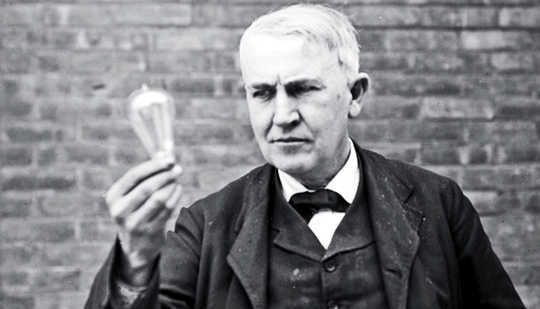
Scientists known for their hard work—like Thomas Edison—are more motivating as role models than scientists viewed as naturally brilliant, like Albert Einstein, new research suggests.
In a series of studies, researchers found that young people were more motivated by scientists whose success was associated with effort than those whose success was attributed to innate, exceptional intelligence, even if that scientist was Albert Einstein.
Danfei Hu, a doctoral student at Penn State, and Janet N. Ahn, an assistant professor of psychology at William Paterson University, says the findings in Basic and Applied Social Psychology will help dispel certain myths about what it takes to succeed in science.
“There’s a misleading message out there that says you have to be a genius in order to be a scientist,” Hu says. “This just isn’t true and may be a big factor in deterring people from pursuing science and missing out on a great career. Struggling is a normal part of doing science and exceptional talent is not the sole prerequisite for succeeding in science. It’s important we help spread this message in science education.”
According to the researchers, there is concern in the science community with the number of students who pursue careers in science during school only to drop out from those career paths once they graduate from college. Researchers have coined this phenomenon as the “leaking STEM pipeline.”
To help solve the problem, Hu and Ahn wanted to research role modeling, which gives aspiring scientists specific goals, behaviors or strategies they can mimic. But while previous studies have examined qualities that make role models effective, Hu and Ahn were curious about whether the aspiring scientists’ own beliefs about potential role models had an effect on their motivation.
“The attributions people make of others’ success are important because those views could significantly impact whether they believe they, too, can succeed,” Ahn says. “We were curious about whether aspiring scientists’ beliefs about what contributed to the success of established scientists would influence their own motivation.”
The researchers performed three studies with 176, 162, and 288 participants in each, respectively. In the first study, all participants read the same story about common struggles a scientist encountered in their science career. However, half thought the story was about Einstein, while half believed it was about Thomas Edison.
Despite the stories being the same, participants were more likely to believe natural brilliance was the reason for Einstein’s success. Additionally, the participants who believed the story was about Edison were more motivated to complete a series of math problems.
“This confirmed that people generally seem to view Einstein as a genius, with his success commonly linked to extraordinary talent,” Hu says. “Edison, on the other hand, is known for failing more than 1,000 times when trying to create the light bulb, and his success is usually linked to his persistence and diligence.”
In the second study, participants once again read a story about a struggling scientist, but while one half of the sample believed it was about Einstein, the other half thought it was about a fabricated scientist whose name—Mark Johnson—was previously unfamiliar to them. Compared to those believing they were reading about Einstein, participants who read about Mark Johnson were less likely to think exceptional talent was necessary for success and more likely to perform better on a series of math problems.
Finally, the researchers wanted to perform a final study to see if people simply felt demotivated in comparison to Einstein or if Edison and an unknown scientist could boost participants’ motivation.
In the third study, the researchers followed the same procedure as the previous two experiments with one change: They randomly assigned participants to read a story about an unknown scientist, Einstein, or Edison. Compared to the unknown scientist, Edison motivated participants while Einstein demotivated them.
“The combined results suggest that when you assume that someone’s success is linked to effort, that is more motivating than hearing about a genius’s predestined success story,” Hu says. “Knowing that something great can be achieved through hard work and effort, that message is much more inspiring.”
Hu and Ahn both believe that in addition to providing insight for how to enhance scientists’ effectiveness as role models, the findings can also help optimize science education for students of all ages.
“This information can help shape the language we use in textbooks and lesson plans and the public discourse regarding what it takes to succeed in science,” Hu says. “Young people are always trying to find inspiration from and mimic the people around them. If we can send the message that struggling for success is normal, that could be incredibly beneficial.”
Additional researchers from New York University and Columbia University participated in the work. The National Science Foundation helped support this research along with a research stipend from William Paterson University.
Books on Improving Performance from Amazon's Best Sellers list
"Peak: Secrets from the New Science of Expertise"
by Anders Ericsson and Robert Pool
In this book, the authors draw on their research in the field of expertise to provide insights into how anyone can improve their performance in any area of life. The book offers practical strategies for developing skills and achieving mastery, with a focus on deliberate practice and feedback.
Click for more info or to order
"Atomic Habits: An Easy & Proven Way to Build Good Habits & Break Bad Ones"
by James Clear
This book offers practical strategies for building good habits and breaking bad ones, with a focus on small changes that can lead to big results. The book draws on scientific research and real-world examples to provide actionable advice for anyone looking to improve their habits and achieve success.
Click for more info or to order
"Mindset: The New Psychology of Success"
by Carol S. Dweck
In this book, Carol Dweck explores the concept of mindset and how it can impact our performance and success in life. The book offers insights into the difference between a fixed mindset and a growth mindset, and provides practical strategies for developing a growth mindset and achieving greater success.
Click for more info or to order
"The Power of Habit: Why We Do What We Do in Life and Business"
by Charles Duhigg
In this book, Charles Duhigg explores the science behind habit formation and how it can be used to improve our performance in all areas of life. The book offers practical strategies for developing good habits, breaking bad ones, and creating lasting change.
Click for more info or to order
"Smarter Faster Better: The Secrets of Being Productive in Life and Business"
by Charles Duhigg
In this book, Charles Duhigg explores the science of productivity and how it can be used to improve our performance in all areas of life. The book draws on real-world examples and research to provide practical advice for achieving greater productivity and success.



























